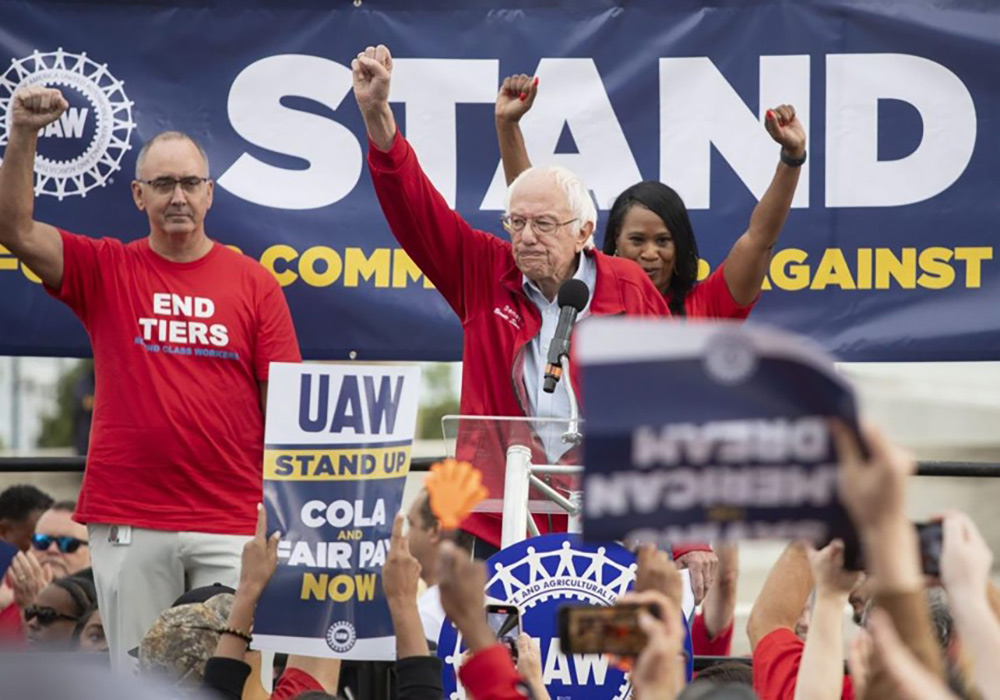
這場歷史性的汽車工人罷工潮涉及底特律三大汽車制造商——通用汽車(General Motors)、斯泰蘭蒂斯集團(Stellantis)和福特(Ford)。站在罷工最前線的是美國汽車工人聯(lián)合會主席肖恩·費恩,他經(jīng)常穿著一件寫著“吞噬富人”的T恤。費恩毫不諱言他對超級富豪的看法。“在我看來,億萬富翁就沒有存在的權(quán)利。”費恩上個月說,他將佛蒙特州參議員伯尼·桑德斯(左翼煽動者)最鐘愛的理論帶到了勞工運動前沿。
多年來,這位進步的議員一直在表達他的觀點,“就不應該有億萬富翁”,并將其作為他兩次總統(tǒng)競選的核心內(nèi)容,甚至提議征收財富稅來淘汰億萬富翁。費恩反億萬富翁的言論是桑德斯論點的合乎邏輯的延伸。這一言論已成為正在進行的汽車罷工的核心。
正如桑德斯的大膽競選主張(對富人增稅與大幅增加聯(lián)邦開支)顛覆了民主黨數(shù)十年來關(guān)于選民能夠接受的信息類型的傳統(tǒng)思想,更不用說其關(guān)于團結(jié)支持的傳統(tǒng)思想了,費恩毫不掩飾的反億萬富翁情緒標志著美國勞工運動進入了一個新時代。幾十年來,美國勞工運動從未如此激進過。
“億萬富翁的存在向我們表明,我們的經(jīng)濟是為少數(shù)人而不是多數(shù)人的利益服務的。”費恩在8月底對美國汽車工人聯(lián)合會成員表示。“我說,低工資和長時間工作也是如此。我們需要消滅這一切。”
恰好,費恩和桑德斯最近有了交集。在9月15日,桑德斯參加了美國汽車工人聯(lián)合會的集會和游行。約4萬名參加罷工的汽車工會工人要求在四年的合同期內(nèi)加薪近40%,以彌補多年通貨膨脹帶來的生活壓力,并提供其他福利。
汽車制造商試圖將工人的工資要求描述為不切實際,美國汽車工人聯(lián)合會以三大汽車公司首席執(zhí)行官的工資為例,對此予以回擊。三大汽車公司首席執(zhí)行官的薪酬是普通工人薪酬的數(shù)百倍(也是歐洲汽車制造商首席執(zhí)行官薪酬的數(shù)倍)。
當福特首席執(zhí)行官吉姆·法利(Jim Farley)告訴美國全國廣播公司財經(jīng)頻道(CNBC),公司“不可能”滿足美國汽車工人聯(lián)合會的要求時,美國汽車工人聯(lián)合會在X平臺上反駁道:“這個人去年賺了2100萬美元。”根據(jù)美國證券交易委員會(SEC)的文件,2022年,福特員工的收入中位數(shù)不到7.5萬美元,而法利的收入相當于281名福特員工的收入。
至少有一位分析師站在美國汽車工人聯(lián)合會一邊,摩根士丹利(Morgan Stanley)在一份報告中表示,汽車制造商很可能負擔得起工會提出的加薪36%的要求——費恩本人也稱這一要求“大膽”。
自從五周前罷工開始以來,一些人擔心長期停工會對經(jīng)濟造成影響,商業(yè)圓桌會議(Business Roundtable)表示"深感擔憂"。但費恩把責任推給了汽車制造商,暗示三巨頭的高層蒙受的損失最大。
“這并不是說我們會破壞經(jīng)濟,而是我們會破壞他們的經(jīng)濟,這種經(jīng)濟只為億萬富翁階層服務,而不是為工人階級服務。”費恩在9月份對美國有線電視新聞網(wǎng)(CNN)說道。
費恩在密歇根州韋恩市的福特工廠外對媒體說:“有億萬富翁階層,也有我們這些普通人。他們希望我們袖手旁觀,靠殘羹剩飯勉強度日,過著月光族的生活。我們是二等公民。”
桑德斯在美國汽車工人聯(lián)合會罷工中發(fā)揮的作用
桑德斯多年來一直在說著同樣的套話。長期以來,這位參議員一直鼓吹對美國社會中最富有的階層大幅增加稅收。在2019年競選民主黨總統(tǒng)候選人提名期間,他提出了一項稅收計劃,最終將消滅億萬富豪階層,并將他們的財富重新分配給工人階級。
在今年5月接受HBO Max的一檔名為《誰在和克里斯·華萊士談話》(Who's Talking to Chris Wallace)的節(jié)目采訪時,桑德斯捍衛(wèi)了這一觀點。
“你的意思是,一旦你的財富達到9.99億美元,政府就應該沒收剩下的所有財富?”有人問桑德斯道。
“是的。”桑德斯回答道。“你可能不同意我的觀點,但我認為人們可以靠9.99億美元過活。我認為他們可以過上舒適生活。”
他說:" [少數(shù)]人擁有比美國社會最底層的50%的人更多的財富,如果這樣的現(xiàn)象不復存在,經(jīng)濟會充滿活力。"他還補充說,如果按照他的意愿來執(zhí)行,那么那些“賺得盆滿缽滿”的人將不得不“支付一大筆錢”。
福特和通用汽車已經(jīng)感受到為期五周的罷工帶來的壓力。通用汽車首席財務官保羅·雅各布森(Paul Jacobson)在周二的財報電話會議上表示,罷工今年給公司造成了8億美元的損失,此后每周還將造成2億美元的損失。同一天,通用汽車披露本季度利潤超過30億美元,費恩的工會擴大了罷工規(guī)模,5,000名工人離開了位于德克薩斯州阿靈頓的工廠(該工廠生產(chǎn)通用汽車利潤最高的SUV車型)。
費恩周五表示,汽車制造商已就加薪23%達成一致,但他告訴成員,“還要爭取更多。”這讓一些人懷疑他的“大膽”要求是否太過分了,或者他是否有計劃結(jié)束罷工。
“他從公司那里得到的東西遠遠超出了任何人,尤其是公司所預期的。”加州大學伯克利分校專門研究勞工問題的名譽教授哈利·沙肯(Harley Shaiken)告訴美聯(lián)社(Associated Press)。“但現(xiàn)在是關(guān)鍵的時刻,你要把所有計劃整合在一起。如果不是現(xiàn)在,更待何時呢?”(財富中文網(wǎng))
譯者:中慧言-王芳
2023年9月15日,參議員伯尼·桑德斯(Bernie Sanders)和美國汽車工人聯(lián)合會(UAW)主席肖恩·費恩(Shawn Fain,左)在密歇根州底特律舉行的支持美國汽車工人聯(lián)合會成員罷工的集會上發(fā)表講話(罷工潮涉及底特律三大汽車制造商)。
這場歷史性的汽車工人罷工潮涉及底特律三大汽車制造商——通用汽車(General Motors)、斯泰蘭蒂斯集團(Stellantis)和福特(Ford)。站在罷工最前線的是美國汽車工人聯(lián)合會主席肖恩·費恩,他經(jīng)常穿著一件寫著“吞噬富人”的T恤。費恩毫不諱言他對超級富豪的看法。“在我看來,億萬富翁就沒有存在的權(quán)利。”費恩上個月說,他將佛蒙特州參議員伯尼·桑德斯(左翼煽動者)最鐘愛的理論帶到了勞工運動前沿。
多年來,這位進步的議員一直在表達他的觀點,“就不應該有億萬富翁”,并將其作為他兩次總統(tǒng)競選的核心內(nèi)容,甚至提議征收財富稅來淘汰億萬富翁。費恩反億萬富翁的言論是桑德斯論點的合乎邏輯的延伸。這一言論已成為正在進行的汽車罷工的核心。
正如桑德斯的大膽競選主張(對富人增稅與大幅增加聯(lián)邦開支)顛覆了民主黨數(shù)十年來關(guān)于選民能夠接受的信息類型的傳統(tǒng)思想,更不用說其關(guān)于團結(jié)支持的傳統(tǒng)思想了,費恩毫不掩飾的反億萬富翁情緒標志著美國勞工運動進入了一個新時代。幾十年來,美國勞工運動從未如此激進過。
“億萬富翁的存在向我們表明,我們的經(jīng)濟是為少數(shù)人而不是多數(shù)人的利益服務的。”費恩在8月底對美國汽車工人聯(lián)合會成員表示。“我說,低工資和長時間工作也是如此。我們需要消滅這一切。”
恰好,費恩和桑德斯最近有了交集。在9月15日,桑德斯參加了美國汽車工人聯(lián)合會的集會和游行。約4萬名參加罷工的汽車工會工人要求在四年的合同期內(nèi)加薪近40%,以彌補多年通貨膨脹帶來的生活壓力,并提供其他福利。
汽車制造商試圖將工人的工資要求描述為不切實際,美國汽車工人聯(lián)合會以三大汽車公司首席執(zhí)行官的工資為例,對此予以回擊。三大汽車公司首席執(zhí)行官的薪酬是普通工人薪酬的數(shù)百倍(也是歐洲汽車制造商首席執(zhí)行官薪酬的數(shù)倍)。
當福特首席執(zhí)行官吉姆·法利(Jim Farley)告訴美國全國廣播公司財經(jīng)頻道(CNBC),公司“不可能”滿足美國汽車工人聯(lián)合會的要求時,美國汽車工人聯(lián)合會在X平臺上反駁道:“這個人去年賺了2100萬美元。”根據(jù)美國證券交易委員會(SEC)的文件,2022年,福特員工的收入中位數(shù)不到7.5萬美元,而法利的收入相當于281名福特員工的收入。
至少有一位分析師站在美國汽車工人聯(lián)合會一邊,摩根士丹利(Morgan Stanley)在一份報告中表示,汽車制造商很可能負擔得起工會提出的加薪36%的要求——費恩本人也稱這一要求“大膽”。
自從五周前罷工開始以來,一些人擔心長期停工會對經(jīng)濟造成影響,商業(yè)圓桌會議(Business Roundtable)表示"深感擔憂"。但費恩把責任推給了汽車制造商,暗示三巨頭的高層蒙受的損失最大。
“這并不是說我們會破壞經(jīng)濟,而是我們會破壞他們的經(jīng)濟,這種經(jīng)濟只為億萬富翁階層服務,而不是為工人階級服務。”費恩在9月份對美國有線電視新聞網(wǎng)(CNN)說道。
費恩在密歇根州韋恩市的福特工廠外對媒體說:“有億萬富翁階層,也有我們這些普通人。他們希望我們袖手旁觀,靠殘羹剩飯勉強度日,過著月光族的生活。我們是二等公民。”
桑德斯在美國汽車工人聯(lián)合會罷工中發(fā)揮的作用
桑德斯多年來一直在說著同樣的套話。長期以來,這位參議員一直鼓吹對美國社會中最富有的階層大幅增加稅收。在2019年競選民主黨總統(tǒng)候選人提名期間,他提出了一項稅收計劃,最終將消滅億萬富豪階層,并將他們的財富重新分配給工人階級。
在今年5月接受HBO Max的一檔名為《誰在和克里斯·華萊士談話》(Who's Talking to Chris Wallace)的節(jié)目采訪時,桑德斯捍衛(wèi)了這一觀點。
“你的意思是,一旦你的財富達到9.99億美元,政府就應該沒收剩下的所有財富?”有人問桑德斯道。
“是的。”桑德斯回答道。“你可能不同意我的觀點,但我認為人們可以靠9.99億美元過活。我認為他們可以過上舒適生活。”
他說:" [少數(shù)]人擁有比美國社會最底層的50%的人更多的財富,如果這樣的現(xiàn)象不復存在,經(jīng)濟會充滿活力。"他還補充說,如果按照他的意愿來執(zhí)行,那么那些“賺得盆滿缽滿”的人將不得不“支付一大筆錢”。
福特和通用汽車已經(jīng)感受到為期五周的罷工帶來的壓力。通用汽車首席財務官保羅·雅各布森(Paul Jacobson)在周二的財報電話會議上表示,罷工今年給公司造成了8億美元的損失,此后每周還將造成2億美元的損失。同一天,通用汽車披露本季度利潤超過30億美元,費恩的工會擴大了罷工規(guī)模,5,000名工人離開了位于德克薩斯州阿靈頓的工廠(該工廠生產(chǎn)通用汽車利潤最高的SUV車型)。
費恩周五表示,汽車制造商已就加薪23%達成一致,但他告訴成員,“還要爭取更多。”這讓一些人懷疑他的“大膽”要求是否太過分了,或者他是否有計劃結(jié)束罷工。
“他從公司那里得到的東西遠遠超出了任何人,尤其是公司所預期的。”加州大學伯克利分校專門研究勞工問題的名譽教授哈利·沙肯(Harley Shaiken)告訴美聯(lián)社(Associated Press)。“但現(xiàn)在是關(guān)鍵的時刻,你要把所有計劃整合在一起。如果不是現(xiàn)在,更待何時呢?”(財富中文網(wǎng))
譯者:中慧言-王芳
At the forefront of the historic auto workers’ strike that’s roiling Detroit’s Big Three automakers—General Motors, Stellantis, and Ford—is United Auto Workers (UAW) president Shawn Fain, and he’s often literally wearing an “EAT THE RICH” t-shirt. Fain hasn’t been shy about voicing his opinions on the ultrawealthy. “Billionaires, in my opinion, don’t have a right to exist,” Fain said last month, and he’s bringing a favorite theory of firebrand Vermont Sen. Bernie Sanders to the forefront of the labor movement.
For years, the progressive lawmaker has been voicing his sentiment that, “There should be no billionaires,” making it the centerpiece of his two presidential campaigns and even proposing a wealth tax to make them obsolete. Fain’s anti-billionaire rhetoric is the logical extension of Sanders’ argument—and the narrative has become central to the ongoing auto strike.
Just as Sanders’ bold tax-and-spend campaign overturned decades of conventional Democratic thinking about the kinds of messages that voters could stomach, let alone rally behind, Fain’s unapologetic anti-billionaire sentiments mark a new era in the U.S. labor movement, which hasn’t been this militant in decades.
“The very existence of billionaires shows us that we have an economy that is working for the benefit of the few and not the many,” Fain told UAW members at the end of August. “I say the same is true for poverty wages and long hours. We need to wipe them out.”
Fittingly, Fain and Sanders recently crossed paths when the senator joined the UAW for a rally and march on Sept. 15. Some 40,000 striking unionized auto workers are demanding a nearly 40% pay raise over the course of a four-year contract to make up for years of inflation, as well as other benefits.
The UAW has shot down automakers’ attempts to paint workers’ wage demands as unrealistic by pointing to the salaries of the Big Three CEOs, who are paid hundreds of times the salary of their average worker (and multiple times what CEOs at European carmakers earn).
When Ford CEO Jim Farley told CNBC there was “no way” the company could meet the UAW’s demands, the union shot back on X, “This man made $21 MILLION DOLLARS last year.” In 2022, the median Ford employee made less than $75,000, while Farley took home the pay equivalent to 281 Ford workers, according to SEC filings.
At least one analyst is on the UAW’s side, with Morgan Stanley saying in a note that the automakers could likely afford the union’s demand for a 36% pay hike—something Fain himself has called “audacious.”
Since the strike began over five weeks ago, some have feared the impact that a long-lasting work stoppage could have on the economy, with the Business Roundtable saying it is “deeply concerned.” But Fain has put the responsibility on the carmakers, suggesting that it’s the top brass at the Big Three who have the most to lose.
“It’s not [that] we’ll wreck the economy. We’ll wreck their economy, the economy that only works for the billionaire class and not the working class,” Fain told CNN in September.
“There’s a billionaire class, and there’s the rest of us,” Fain told the press outside a Ford plant in Wayne, Mich. “We’re all expected to sit back and take the scraps and live paycheck to paycheck and scrape to get by. We’re second-class citizens.”
Sanders’ hand in the UAW strikes
Sanders has been saying variations of the same lines for years. The senator has long touted the idea of imposing much higher taxes on the wealthiest factions of U.S. society. During his 2019 campaign for the Democratic presidential nomination, he created a tax plan that would eventually eliminate the billionaire class and redistribute their wealth to the working class.
In a May interview with HBO Max’s Who’s Talking to Chris Wallace, Sanders aggressively defended this view.
“Are you basically saying that once you get to $999 million, the government should confiscate all the rest?” Sanders was asked
“Yeah,” Sanders responded. “You may disagree with me, but I think people can make it on $999 million. I think that they can survive just fine.”
“You can have a vibrant economy without [a handful of] people owning more wealth than the bottom half of American society,” he said, adding that, if he had his way then those making “a whole lot of money” would have to “pay a whole lot of money.”
Ford and General Motors are already feeling the pinch from the five-week strike. General Motors CFO Paul Jacobson said on Tuesday’s earnings call that the strike impacted it by $800 million this year, and are due to cost it $200 million per week after that. The same day, GM disclosed a profit of more than $3 billion for the quarter—and Fain’s union widened its strike, with 5,000 workers walking out of the Arlington, Texas, plant that makes GM’s most profitable SUV models.
Fain said on Friday that the automakers had united on a 23% wage hike but told members that “there is more to be won.” This has led some to wonder if his “audacious” demands have gone too far—or if he has a plan to bring the strikes to a close.
“He’s gotten far more from the companies than anyone, in particular the companies, may have expected,” Harley Shaiken, a professor emeritus specializing in labor at the University of California Berkeley, told the Associated Press. “But now is the critical point where you pull the package together. If it isn’t now, when will it be?”






